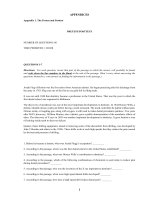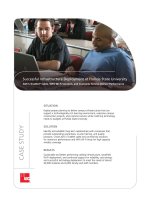Successful Infrastructure Deployment at Florida State University
Bạn đang xem bản rút gọn của tài liệu. Xem và tải ngay bản đầy đủ của tài liệu tại đây (249.99 KB, 4 trang )
CASE STUDY
SITUATION
Deploy proper planning to deliver campus infrastructures that can
support a technologically rich learning environment, extensive campus
construction projects, and customer service while matching technology
needs to budgets at Florida State University.
SOLUTION
Identify and establish long-term relationships with companies that
provide outstanding warrantees, on-site training, and quality
products. Chose ADC’s TrueNet cable and connectivity solutions
for maximum performance and WFX Wi-Fi Array for high-capacity
wireless coverage.
RESULTS
Sustainable and better performing cabling infrastructure, simplified
Wi-Fi deployment, and continued support for reliability, cost-savings,
and successful technology deployment to meet the needs of almost
40,000 students and 6,000 faculty and staff members.
Successful Infrastructure Deployment at Florida State University
ADC’s TrueNet
®
Cable, WFX Wi-Fi Solution, and Customer Service Deliver Performance
CASE STUDY
Since its inception in 1851, Florida State
University (FSU) has expanded to include
16 colleges that offer over 300 degree programs
at the undergraduate, graduate, and doctoral
levels, including psychology and medicine.
FSU is comprised of over 100 buildings set
on the 463-acre main campus in Tallahassee,
Florida. While its history stems back to the
pre-civil war era, and its buildings stand majestic
with their Jacobean architecture, it's what you
don't see that makes FSU a technologically rich
learning environment.
SITUATION
Established in June 2000 through the legislative
laws of Florida, the FSU College of Medicine
is one of the first U.S. publicly funded medical
schools in over 20 years. With the chance to
build a medical program and associated facilities
from the ground up, the college recognized the
need to place an emphasis on the integration of
information technology resources and medical
informatics throughout the curriculum.
With its mission of serving the unique needs of
Floridians, the College of Medicine graduated its
first class of 30 students in 2005. Starting in June
2007, the College of Medicine will admit 120
students a year on the way to a full enrollment
of 480 students. Originally housed in temporary
space and portable buildings, the College of
Medicine broke ground in 2003 on a new
$60 million 300,000 square-foot facility
constructed in three phases.
In 2004, FSU also broke ground on a new
$55 million Psychology Complex, designed to
bring together some 1,500 students and 50
faculty members who were housed in several
buildings around campus and a rented location
in downtown Tallahassee. The first phase of the
184,678 square-foot facility was completed in
August 2006.
This type of construction on the FSU campus
is not uncommon as the university continues
to build new facilities to serve the needs of
the almost 40,000 students and 6,000 faculty
and staff members. FSU’s more than 20 current
construction projects include a new 88,000
square-foot classroom building, 180,000 square-
foot life science and research center, and 168,000
square-foot chemistry building.
Within the walls and ceilings of each of these
facilities, miles of cabling delivers LAN access,
video service, security, and telephone service to
create a technologically rich learning environment.
And at the core of planning, budgeting, and
deployment of this entire infrastructure is FSU’s
Office of Telecommunications (OTC). Founded in
1988 with just 10 employees, OTC is now made
up of over 100 employees who are responsible
for delivering technology to match the ever-
changing needs of students and faculty in every
area of study. Within OTC is a team of individuals
that makes up the Operations and Technology
department under the direction of Associate
Director Charles Friedrich, RCDD.
“At FSU, we [OTC] take care of all the planning,
design and installation of the network cabling
infrastructure, networking equipment, and
service delivery. This is preferred to contracting
that work to someone from the outside,” says
Friedrich. “The result is a sense of ownership and
pride that comes from knowing that if we don’t
do it right, we’re going to have to deal with the
consequences. Over the past 18 years, we’ve built
a team and developed institutional knowledge,
training, inventory, and management tools all
integrated into a single package.”
Built around a central courtyard, the new FSU College
of Medicine includes areas for research, education,
and administration, and a 300-seat auditorium. The
facility features 15 telecommunications closets where
over 255,000 feet of ADC’s TrueNet Category 5e
cabling terminates to support 1,696 possible network
connections.
CASE STUDY
At FSU, buildings are designed and constructed
to be “legacy” buildings, and some campus
buildings are 75 to 100 years old. FSU strives
to enable future generations of Seminoles to
enjoy the campus’ exquisite architecture. While
constructing these buildings, OTC is aggressive
in planning ample pathway, conduit space,
and communications closets. “We design the
buildings to easily retrofit with new technology
as requirements evolve,” says Friedrich. “I’m very
pleased with our planning process, which involves
budgeting for each element of the network
infrastructure, including manhole systems, outside
plant cable, instrumentation, premise cabling, and
network equipment—both wired and wireless.”
SOLUTION
With so much network infrastructure to install
and maintain, OTC has relied heavily on steady,
mutual relationships with vendors that offer
quality products, comprehensive training, and
first-rate service. Since the early 1990s, FSU
has been using ADC’s cabling and connectivity
solutions to deliver network access and telephony
service across campus.
“Approximately every three to four years, we
evaluate four or five different manufacturers of
network cabling. We install it, we test it, and
we look at performance and ease of use,” says
Friedrich. “Then we narrow it down to one
specific vendor that outperforms the others,
and for over a decade, that has been ADC’s
solutions.”
With a solid vendor relationship and quality
product, OTC once again turned to ADC when it
came time to implement the cabling infrastructure
in the College of Medicine and Psychology
Complex. Both facilities feature ADC’s TrueNet
®
Category 5e cabling to deliver 100 Mbps network
speeds to the desktop. The cabling also connects
to wireless access points (WAPs) throughout the
facilities.
Ken Johnson, College of Medicine’s director of
information technology says, “Every medical
student at FSU is provided with a college-
owned laptop and PDA during the first year of
medical school. Students also receive the same
help desk support that is received by faculty
and staff. These practices are unusual for most
medical schools, not to mention higher education
institutions in general. The success of the college's
academic program is interwoven with our IT
infrastructure, and obviously wiring is a big part
of that. Our IT network represents one of the
highest concentrations of wired and wireless
infrastructure for any academic organization here
at FSU.”
Ken Johnson, director of
information technology
for the College of
Medicine, knows the
importance of a quality
IT infrastructure in
establishing a successful
academic medical
program.
Charles Friedrich, RCDD
With an annual operating budget
of over $13 million, FSU’s Office
of Telecommunications receives
approximately 4,000 work orders and
3,000 telecommunications repairs every
year. Tasks can range from a simple
move of a phone to cabling entire new
facilities like the FSU College of Medicine
and Psychology Complex.
The department’s staff of ADC trained
technicians and RCDDs take care of all
telecommunications-related services
and systems on campus, including 2,500
CATV outlets, 13,000 local phone lines,
and a CISCO/FOUNDRY-powered gigabit
and 10-gigabit core network.
“We don’t consider ourselves to be
technologists. We consider OTC a service
organization that just happens to deliver
technology,” says Friedrich. “Our biggest
challenge is matching technology to
needs while meeting budgets and still
offering quality customer care.”
Web Site: www.adc.com
From North America, Call Toll Free: 1-800-366-3891 • Outside of North America: +1-952-938-8080
Fax: +1-952-917-3237 • For a listing of ADC’s global sales office locations, please refer to our Web site.
ADC Telecommunications, Inc., P.O. Box 1101, Minneapolis, Minnesota USA 55440-1101
Specifications published here are current as of the date of publication of this document. Because we are continuously
improving our products, ADC reserves the right to change specifications without prior notice. At any time, you may
verify product specifications by contacting our headquarters office in Minneapolis. ADC Telecommunications, Inc.
views its patent portfolio as an important corporate asset and vigorously enforces its patents. Products or features
contained herein may be covered by one or more U.S. or foreign patents. An Equal Opportunity Employer
103844AE 11/06 Original © 2006 ADC Telecommunications, Inc. All Rights Reserved
CASE STUDY
OTC also deployed ADC’s Category 3 cable in
each of the facilities to provide separate voice
systems. “For E-911 and other operational
purposes, we like to keep our voice network
separate and secure,” explains Friedrich. “This
also makes adds, moves, and changes to the voice
system much simpler.”
In the new Psychology Complex, OTC installed
ADC’s new WFX Wi-Fi Array, a next generation,
high-capacity Wi-Fi solution. “We have wireless
throughout the entire campus with many
different types of devices,” says Friedrich. “We are
evaluating the coverage and cost benefits of the
ADC WFX Wi-Fi Arrays, and we anticipate possibly
deploying them in other facilities in the near
future, such as the new classroom building that
will see almost 30,000 student visits daily.”
ADC’s WFX Wi-Fi Arrays include an embedded
array controller to control and optimize up to 16
integrated access point configurations that deliver
up to 864 Mbps of Wi-Fi bandwidth over a large
area. With the WFX Wi-Fi solution, customers can
install fewer devices. This innovative approach
simplifies deployment and management of Wi-Fi
networks, maximizing the amount of bandwidth
and coverage available at a lower cost.
RESULTS
By implementing and maintaining all
telecommunications cabling infrastructure and
services on campus, FSU’s OTC is able to keep
costs down and easily manage every task at hand.
The solid relationship with ADC and quality cable
and connectivity components has enabled OTC
to continually match needs and technologies
with budgets as they did with the FSU College
of Medicine and new Psychology Complex. ADC
continues to present and demonstrate new
products and technologies to further help OTC
fulfill their ultimate goal of customer service.
As the university moves forward with additional
construction projects, the relationship with ADC
will prove to be invaluable.
“We consistently utilize our partnership with ADC
for the warrantees, onsite training, and product
quality we need for a successful campus network
infrastructure,” says Friedrich. “It has become
evident to me over the years that every university
needs partners they can count on, and we try to
partner and depend upon all our vendors in the
same way that we have with ADC. With these
types of relationships, OTC and FSU just can’t
lose.”
Located on west campus, the new five-story FSU
Psychology Complex includes a psychology clinic,
49 research labs, and a 220-seat auditorium. Phase 1
of the facility features 10 telecommunications closets
where over 143,700 feet of ADC’s TrueNet Category
5e cabling terminates to support 958 possible
network connections.









